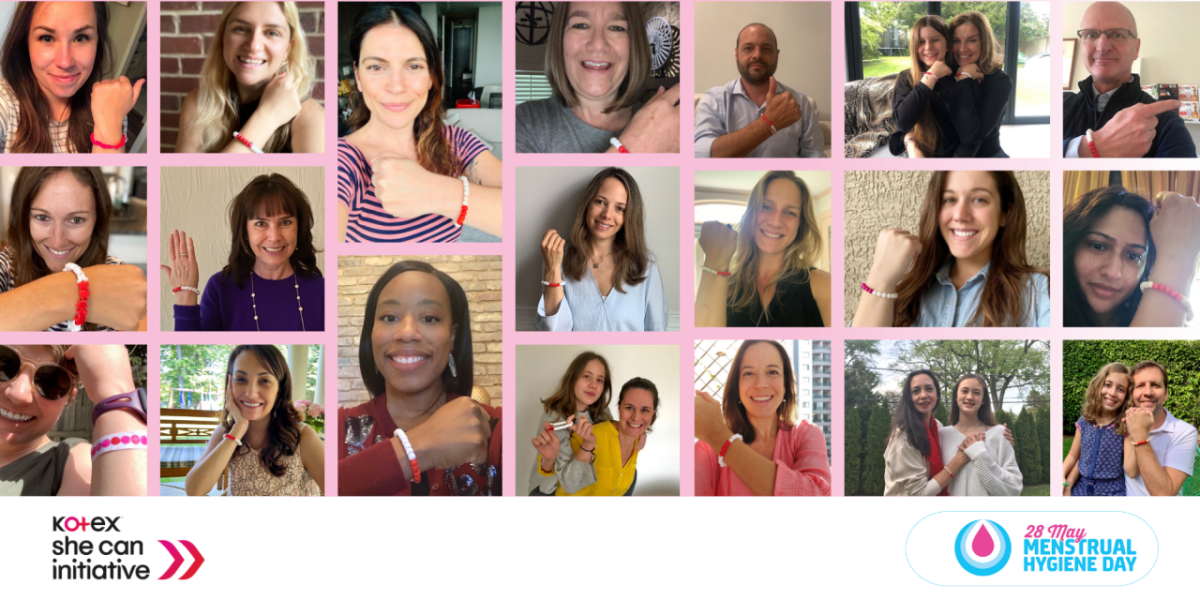Kotex and NGO Partners 'Ignite a New Cycle' to Champion a Better Future for Women and Girls

“I wear my Menstruation Bracelet as a reminder that periods are a natural part of being a woman, yet they hold so many women and girls back from what they can achieve,” said Alessandra Castro, the global brand purpose and social impact director for adult and feminine care at Kimberly-Clark.
It’s 2021, yet millions of women and girls do not have access to products to adequately manage their menstrual cycles, and shame and stigmas around periods prevent women from attending school, work and other activities.
Thorsten Kiefer, the founder and CEO of WASH United and Menstrual Hygiene Day (MHD), believes we can eliminate these stigmas and provide access to life-changing period products around the globe in less than a decade.
“It will take both the private and public sectors and governments to make these goals a reality by 2030,” said Kiefer. “We must step up action and investment now.”
Kiefer and Castro participated in ‘Igniting a New Cycle,’ a Facebook Live discussion hosted by Kimberly-Clark and its Kotex® brand today as part of its global She Can Initiative. They joined other leaders from Kimberly-Clark and Plan International, a nonprofit that advances children’s rights and equality for girls in 75 countries around the world.
Partners work together to create a world where no woman is held back because she menstruates
Kiefer founded MHD – which takes place on May 28 – in 2014, and the day has become a global advocacy platform that brings together the voices and actions of nonprofits, government agencies, individuals, the private sector and the media to promote good menstrual health and hygiene for all women and girls.
“Menstruation is a perfectly normal physical function, and half of the world experiences it for a significant part of their lives,” said Kiefer. “There’s nothing dirty or shameful about it – without menstruation, none of us would even exist.”
He added, “Women and girls around the globe continue to be excluded, stigmatized and held back from reaching their full potential simply because they menstruate. That’s unacceptable, and it’s not just a women’s issue – it’s a human issue. All of have a responsibility to end period stigma, and we must engage men and boys and change how they think, feel and act about menstruation.”
In partnership with Kimberly-Clark and other organizations, Menstrual Hygiene Day has provided over 1.6 million girls with education about menstruation, but it’s clear that there’s still a lot of work to do.
Kimberly-Clark and Kotex® fight period stigmas around the globe
“We know that many girls stop going to school during their periods because they’re embarrassed, and that has far-reaching impacts for the rest of their lives,” said Castro. “That’s why Kimberly-Clark’s Kotex® brand exists – to ensure that a period never gets in the way of any woman’s life.”
The brand’s She Can Initiative champions women’s progress by fighting period stigmas and the barriers they cause, by promoting access to education in schools and communities, and by helping to open doors so women gain equal opportunity. During the discussion, Kimberly-Clark leaders in Latin America, North America, Asia-Pacific and Europe, the Middle East and Africa shared some of the challenges that women and girls face in their regions – and the work they’re doing to drive positive change.
“Asia-Pacific is a very diverse region with many different cultures, languages and religions,” said Aparna Dubey, the director for feminine care sector marketing at Kimberly-Clark in Asia-Pacific. “Period stigma varies from complete silence, to casual joking and teasing, to deeply entrenched taboos. Access to adequate sanitation facilities and period products is also a challenge in some areas.”
She added, “In Australia, we recently conducted research which found that 1 in 5 girls are embarrassed to go to school when they’re on their period, and 1 in 2 girls do not have adequate information on menstruation and period products.”
The Kotex® brand’s efforts in Asia-Pacific focus on menstrual hygiene education and access to products, and last year these programs reached over 1 million girls in partnership with NGOs including Plan International and UNICEF.
It’s time for action
Gustavo Quintero, the vice president of operations for Plan International in Colombia, said that we must create a world where girls do not have to be “invisible simply because they’re menstruating.”
“Menstruation is a natural event, and we need to start talking about it that way,” said Quintero.
Hiep Phan Dinh, the program manager for Plan International in Vietnam, agreed.
“We want women and girls to become leaders of the change that our world needs, but that’s not possible if they’re forced to drop out of school due to stigmas or taboos,” he said.
“We are excited to continue working with Kimberly-Clark and Kotex® to not only shift but accelerate the conversation so that women and girls of all ages and in every country have an opportunity to realize their dreams.”
The Facebook Live discussion remains available for viewing at www.facebook.com/KimberlyClarkCorp.

